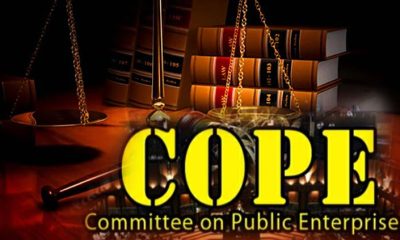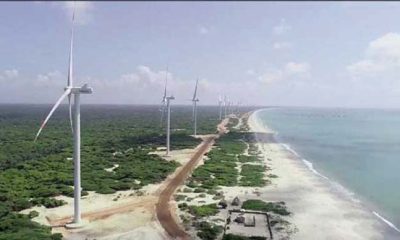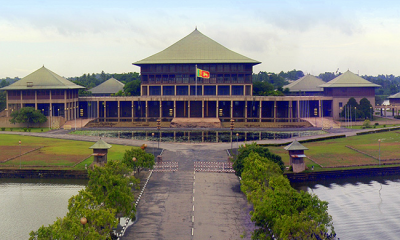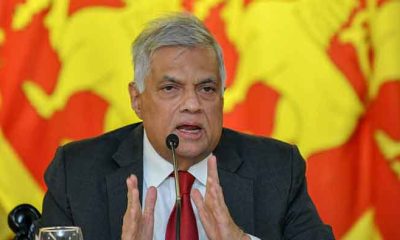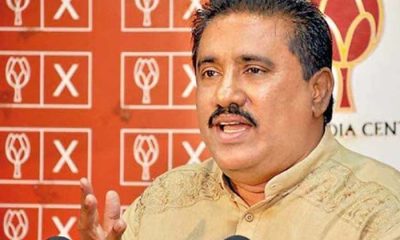Editorial
The mote and the beam

Friday 19th May, 2023
The Committee of Public Enterprises (COPE) has striven over the years to meet the people’s expectations as a parliamentary watchdog outfit. Together with the Auditor General and others, it has exposed numerous state institutions for their shortcomings, accounting irregularities, avoidable losses, waste, and corruption. In some cases, it has even prompted corrective action to be taken. Thankfully, the COPE continues its efforts to enforce accountability in the public sector and rationalise government expenditure, deserving praise for its good work.
Recently, the COPE held a meeting with a group of representatives from vocational training institutions to discuss the Auditor General’s findings on their performance and shortcomings. The proceedings of the meeting are now public. During the discussion, a committee member criticised the officials present for not having basic information about their institutions; he said they should be ashamed. This remark must have resonated with the public.
Our opinion of the state bureaucracy is not very favourable, as it is plagued by corruption and inefficiency, much like the political authority. Decades of politicisation and the lowering of public professional standards under successive governments are to blame. There are still some upright public officials who do not enter into a Faustian pact with politicians and other crooks, but they are unfortunately the exception that proves the rule. Consequently, the public is elated when COPE, the Committee on Public Accounts, etc., take on state officials. However, these parliamentary watchdog committees should uphold natural justice and allow the officials under scrutiny to express their views and defend themselves; the MPs should adhere to the principle of audi alteram partem or hearing the other side. Regrettably, a very senior health official faced the wrath of an MP, who effectively frustrated his attempts to defend his position, during a parliamentary committee meeting. This incident has left a negative impression on many.
There are instances where parliamentary committee members take moral high ground and lash out at public officials for their failures, just as the COPE did when it reprimanded decision-makers in vocational training institutions for their lack of familiarity with their institutions’ affairs, particularly the courses they offer. One cannot help but agree with COPE’s standpoint that public officials should remain informed about the happenings within the institutions under their purview and have necessary information readily available. After all, we live in an information-driven world. However, the question remains: Do the legislators practise what they preach to others?
Last year, when the government declared that the country was bankrupt and had no choice but to default on its debt, many MPs from both the ruling coalition and the opposition claimed that they had been unaware of the dire state of the economy until that time. They sought to shift the blame to the officials of the Central Bank and the Finance Ministry, accusing them of having withheld vital information about the economy and the possibility of a debt default. These same individuals portray themselves as all-knowing when they criticise their political rivals and even ‘disclose’ the amounts of funds allegedly stolen by the latter. Yet, when faced with accountability, they readily profess ignorance!
Article 148 of the Constitution grants Parliament total control over public finance. The MPs therefore have a duty to fulfil their fiduciary responsibilities diligently to the satisfaction of their constituents. Failing to do so would be a neglect of their raison d’être. It is disturbing that most MPs are absent even when crucial financial bills are put to the vote. Although the government claims to have the support of over 120 MPs, only 79 voted in favour of the Inland Revenue (Amendment) Bill in December, with a mere 36 voting against it, in the 225-member House. The annual budget debate reveals the legislators’ lack of comprehension of the Appropriation Bill; they present weak and unfounded arguments. Parliament has become one of the most underperforming state institutions. Shouldn’t MPs put their own House in order before asking others to get their act together?
Editorial
People have spoken

Thursday 8th May, 2025
Sri Lankans have spoken, and what they have said is being interpreted in different ways. That the ruling NPP would be the overall winner in Tuesday’s local government (LG) polls was a foregone conclusion. Its stunning win in last year’s general election, where it obtained 159 out of 225 seats in Parliament, was still fresh when the country went to the polls again. A decline in its vote share was also expected. The Opposition managed to recover lost ground to some extent, but it has a long way to go before it can make a decisive comeback.
JVP General Secretary Tilvin Silva, addressing a press conference yesterday morning, sought to downplay the NPP’s failure to prevent a drastic drop in its vote share during the past six months or so; he claimed that the local government polls were called ‘village elections’, where voters were swayed by various factors other than national issues. That may be generally so, but the NPP made an otherwise grassroots level voting event assume the same importance as a national election, with President Anura Kumara Dissanayake himself leading its LG election campaign. The President and Prime Minister Harini Amarasuriya fervently appealed to the people to vote for the NPP in the LG elections and help consolidate its hold on power. The NPP polled 6.86 million votes (61.56%) in the last parliamentary election, but it could obtain only 4.5 million votes (43.2%) in Tuesday’s LG polls.
Tilvin argued that the NPP’s performance had been better than the SLPP’s in the 2018 LG polls. What he left unsaid was that the SLPP polled 44.6% of votes and secured 231 councils and 3,360 seats while it was in the Opposition, with the UNP-led Yahapalana government and President Maithripala Sirisena going all out to queer the pitch for it. In contrast, the NPP faced Tuesday’s LG polls after winning a presidential election and parliamentary polls late last year. It won 266 councils with 3,926 members. However, it will be able to form stable administrations on its own in only about 133 LG institutions, according to reports available at the time of going to press. This figure is subject to change.
Many local councils, including the Colombo MC are hung, and their members will have to elect their heads. The NPP, which has condemned all its political rivals as rogues, will not be able to enlist the support of the Opposition members to muster working majorities in such councils.
The NPP has come to terms with the fact that its popularity is on the wane, and growing public disillusionment is beginning to weigh on its government. Votes it polled in the North and the East in the last general election helped it secure a two-thirds majority in Parliament. Its support base has shrunk significantly in those parts of the country, where the traditional Tamil political parties have made a comeback. The ITAK has secured 307,657 votes (2.96%) and 377 seats; it has won 37 councils.
The NPP did everything in its power to win the LG polls. The President, the Prime Minister, and all MPs including ministers, were actively involved in its election campaign; the government obviously outspent its rivals in electioneering, gave pay hikes to state workers and subsidies to farmers, put on a mammoth show of strength on May Day, held a relic exposition, branded the Opposition as a bunch of thieves and promised jobs to the youth. Most of all, President Dissanayake himself issued a veiled threat of fund restrictions for the councils to be won by parties other than the NPP. But the government failed to achieve the desired result. Instead of trying to mislead the public, the NPP should figure out what the people have given it a knock for, work on its mistakes and improve its performance. Mere rhetoric won’t do.
Similarly, the Opposition should stop labouring under the delusion that the NPP’s broken promises, the anti-incumbency factor and adverse social media campaigns against the NPP leaders, will enable it to turn the tables on the incumbent government. The SJB, the SLPP, the UNP, etc., have been able to improve their electoral performance significantly, compared to that in the last general election, but they have a lot more ground to cover before they can savour power. The SJB’s votes have increased from 1.9 million (17.66%) in last year’s parliamentary election to 2.2 million (21.6%). The SJB has secured 14 local councils, but it would have been able to bag some more if it had changed its campaign strategy and worked harder. The SLPP, too, has made significant gains; its votes have increased from 350,429 (3.14%) in last year’s general election to 954,517 (9.17%).
The Opposition parties, too, would do well to heed the message the people have conveyed; they have to work harder to win back public trust and secure enough popular support to win elections.
Thankfully, another election has passed without violence or rigging. The Election Commission and the police deserve praise for a job well done.
Editorial
Hurtful propaganda

Wednesday 7th May, 2025
Smearing opponents has become the dominant form of electioneering in Sri Lanka. All political parties unflinchingly resort to mud-slinging during election campaigns, and they are quite adept at making lies indistinguishable from the truth. They float various claims and counterclaims, and leave the public confused and unable to make informed decisions in elections.
One of former President Ranil Wickremesinghe’s close aides, Thusitha Halloluwa, created quite a stir on the eve of Tuesday’s local government polls. He levelled a very serious allegation against President Anura Kumara Dissanayake himself; Dissanayake had made a questionable investment in Greece while calling the Opposition politicians corrupt, he said.
The government let out a howl of protest, and lost no time in reporting Halloluwa to the CID, which amply demonstrated its selective efficiency once again by launching a prompt investigation into the NPP’s complaint. Halloluwa has been summoned to the CID. Having claimed that he has irrefutable evidence to support his claim, he will have to disclose it when he visits the CID today. Will the CID act in a similar manner if complaints are made against the government politicians that they have made statements derogatory of Opposition politicians?
Unsubstantiated allegations against key opposition figures formed a central pillar of the NPP’s election platform. Some NPP politicians claimed that the Rajapaksa family had stashed away billions of dollars in Uganda, and asked for a mandate to bring the stolen money back. Later, one of the NPP MPs who propagated that claim admitted that she had told the public a lie, and argued that anyone had a right to lie! The NPP carried out such propaganda attacks on its political rivals relentlessly, and the media gave them wide publicity, helping it turn public opinion in its favour. What if the Opposition politicians also make complaints to the CID that the NPP made false allegations against them?
Some NPP notables even made complaints to the CID about an alleged conspiracy to tarnish their reputation; they claimed that the Opposition was employing devious methods to have the public believe that they were falsely claiming academic titles. It is doubtful whether the CID has any time left for its regular duties and functions after it investigates government leaders’ complaints against their opponents.
Hardly a day passes without an underworld killing being reported. On Monday, a gunman killed a youth in what resembled a scene from a 1920s Chicago gangster film. CCTV footage shows the victim running away after being shot twice, in Mount Lavinia, and the gunman running after him and shooting him at close range on the Galle Road. These killings show how bold crime syndicates and their death squads have become of late. The police and the CID are apparently not up to the task of neutralising the nether world of narcotics and crime. So, it is hoped that the police will concentrate more on their operations against organised criminal gangs while investigating complaints from government politicians.
The police set up a special unit called the FCID (Financial Crimes Investigation Division) to probe allegations of corruption against the political opponents of the UNP-led Yahapalana government, which the JVP also backed. Given the sheer amount of political work the CID has to handle at present, it looks as if the police had to set up a special unit to probe complaints from the ruling party members so that the CID can devote more time to criminal investigations. That unit can be called the PCID (Political Complaints Investigation Division).
Some media rights groups have expressed serious concern about reports that the government is contemplating legal action against the media outfits that carried Halloluwa’s claim. One of the main reasons why the NPP succeeded in winning elections was wide media coverage of its unsubstantiated allegations against its rivals. So, the question is whether the NPP, which came to power, with the help of social media and a section of the mainstream media, has any moral right to institute legal action against the media for relaying unproven allegations.
Editorial
An election day thought

Tuesday 6th May, 2025
Elections to 339 local government (LG) institutions are set to take place today––at long last. The terms of the local councils, which were last elected in 2018, lapsed in 2022, but the then SLPP government extended them by one year. In 2023, President Ranil Wickremesinghe derailed the LG polls by refusing to allocate funds. A legal battle resulted in the Supreme Court ordering, last year, that the LG elections be held soon.
As many as 75,589 candidates are vying for 8,287 seats in local councils; there are 4,877 wards in all LG institutions. Having campaigned really hard, the main political parties claim to be confident of victory, but many councils are likely to be hung.
The LG polls are held under the mixed proportional system—60% of the councillors are elected on the ward basis under the first-past-the-post system; others are elected under the Proportional Representation system. The new electoral system has led to a two-fold increase in the number of local council members.
Sri Lanka has too many politicians and state employees, as is public knowledge. It is popularly said in this country that ‘if one kicks a wayside bush at random, more than a dozen politicians and state employees will jump out’. The ratio of state employees to citizens is 1:15. There are 225 MPs, 455 provincial councillors, and about 8,287 local council members. There is no fixed number of LG members; the number tends to increase due to the new electoral system, which allows for overhang seats––the LG members elected on the ward basis from a political party or an independent group in excess of its entitlement under the PR system.
It does not make sense to maintain so many elected people’s representatives at the national, provincial and grassroots levels.
The National List (NL), which provides for the appointment of 29 MPs on the basis of political parties’ or independent groups’ shares of the nationwide votes in parliamentary polls, has been abused all these years to appoint defeated candidates and others to Parliament. Some NL appointments even undermine the Constitution; political parties craftily use Section 64 (5) of the Parliamentary Elections Act No 1 of 1981, as amended in 1988, to fill NL vacancies which are engineered, in most cases, to circumvent Article 99A of the Constitution; thus, the persons of party leaders’ choice are appointed to Parliament via the NL. This sordid practice has severely eroded public trust in the electoral process. Successive governments have not cared to amend the Parliamentary Elections Act and the Constitution to prevent defeated candidates and others from being appointed as NL MPs, and therefore the NL mechanism should be done away with.
The Provincial Council (PC) system has become a white elephant, but successive governments have considered it a fait accompli due to Indian pressure. All nine PCs have functioned without elected representatives since 2017! Even the JVP, which is currently in power, as the main constituent of the NPP coalition, has bitten the bullet and chosen to ensure the perpetuation of the PC system, which it went all out to sabotage, albeit in vain, by unleashing mindless terror and destroying lives, in the late 1980s. Serious thought should be given to reducing the number of PC members.
The number of LG members must also be reduced drastically. Many local council wards can be merged, especially in urban areas.
There have been campaigns for controlling the populations of crop-raiding wild animals, such as monkeys. Curiously, no such effort has ever been made to reduce the number of people’s elected representatives, who cause far worse damage to the economy than all crop-depredating wildlife combined. The same goes for the ever-burgeoning public service, which has become a metaphor for inefficiency.
As for today’s election, every vote counts. Happy voting!
-

 News7 days ago
News7 days agoRanil’s Chief Security Officer transferred to KKS
-

 Opinion5 days ago
Opinion5 days agoRemembering Dr. Samuel Mathew: A Heart that Healed Countless Lives
-

 Business3 days ago
Business3 days agoAitken Spence Travels continues its leadership as the only Travelife-Certified DMC in Sri Lanka
-

 Business3 days ago
Business3 days agoLinearSix and InsureMO® expand partnership
-

 Latest News1 day ago
Latest News1 day agoNPP win Maharagama Urban Council
-

 Business7 days ago
Business7 days agoCCPI in April 2025 signals a further easing of deflationary conditions
-

 Features5 days ago
Features5 days agoTrump’s economic missiles are boomeranging
-

 Features7 days ago
Features7 days agoExpensive to die; worship fervour eclipses piety





